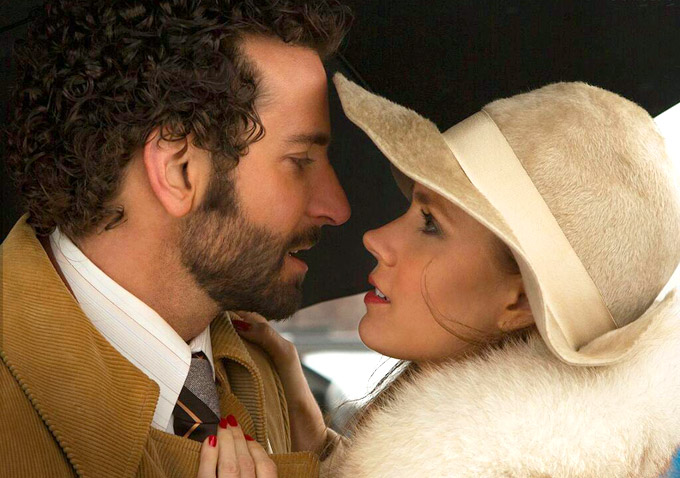
Since making his “comeback” in 2010 with “The Fighter,” David O. Russell has become a filmmaker to admire and respect—but not necessarily love. Both that film and “Silver Linings Playbook” expertly executed their narrative formulas, drawing adoration critical and commercial praise alike, but neither surpass the many, many others that used those same formulas, and unfortunately neither does “American Hustle.” But the difference at least with his latest effort is that it subverts the focus of other ‘70s-set movies about charming crooks—of which “Goodfellas” is the standard-bearer—by emphasizing emotional mechanics over the ones used to perpetrate their crimes.
Christian Bale plays Irving Rosenfeld, a low-level con man who teams up professionally—and romantically—with Sydney Prosser (Amy Adams) to hustle suckers out of $5,000 at a time. The duo eventually attracts the attention of FBI agent Richie DiMaso (Bradley Cooper), who demands their help ensnaring corrupt New Jersey power brokers in exchange for their freedom. Eventually setting his sights on Camden mayor Carmine Polito (Jeremy Renner), DiMaso instructs Rosenfeld to ingratiate himself with the politician, even as he finds himself growing close to Sydney. But after Rosenfeld decides to bring along his wife Rosalyn (Jennifer Lawrence) in order to maintain the veneer of normalcy, the con man’s relationship with Sydney begins to deteriorate even as his unpredictable wife threatens to reveal his true motives to Polito, not to mention the mobsters DiMaso hopes to apprehend with the politician’s arrest.

Although movies like “Goodfellas” are indisputable forebears for Russell’s decadent tale of crime and punishment, the filmmaker distinguishes himself by creating a complex and compelling web of manipulation between the characters that eventually supersedes any of their scheming or con artistry. Indeed, there’s a tendency with movies like this to look ahead from the salad days to the fall from grace, or further, the grand lesson to be taken away from all of the misbehavior and its repercussions, but Russell trains his attention on how all of that behavior directly affects his leads on a deep and personal level and virtually ignores its impact anywhere else.
As the would-be central figures in the story, Rosenfeld and Prosser bond immediately, and share a connection that anyone would be lucky to have. But as DiMaso chips away at their solidarity, and Rosalyn erodes Irving’s resolve, each new development exerts a kind of pressure on all of them that, quite frankly, I feel like I haven’t quite seen in a film like this. Each time DiMaso instructs Rosenfeld to go after another money man, another politician, what’s more interesting than whether or not he succeeds is how his pursuit affects his relationship with Prosser. There’s much more going on than simple jealousy or betrayal: these are characters defined by their ability to prevail over adversity, and each new challenge tests the persona they use to seduce not just an unlucky mark, a suspicious mob boss or the FBI, but the people they love, and even (possibly most importantly) themselves.

While it’s perhaps easier to take for granted Bale’s chameleonic transformation into Rosenfeld—conspicuously overweight, living in an utterly convincing New Jersey accent—Adams is a revelation as Prosser, a young woman who wields her sexuality like a hatchet while simultaneously seducing her victim with a scalpel-like veneer of refinement and sophistication. Meanwhile, it seems impossible to describe DiMaso as anything other than a complete fucking asshole—the embodiment of a person who believes a man’s reach should exceed his grasp—and even though Cooper no doubt harbors some sympathy for the sociopath, he disguises it well enough to enable the audience to properly hate his naïve, aggressive, short-sighted ambition.
As Rosalyn, Lawrence initially seems to have a smaller role in the film than she ultimately plays, but once her character becomes part of the machinery of her husband’s FBI-sanctioned hustle, she steals virtually every scene in which she appears. While there’s admittedly a little bit of grandstanding in her performance—not necessarily from Lawrence herself, but from Russell utilizing her as this irresistible force of nature—the young actress continues to prove not just her versatility but believability, juxtaposing the character’s obnoxious stupidity and her desperate vulnerability in a way that makes her an equal competitor for Irving’s affections, no matter how wrong for him she demonstrates that she is.

Bolstered by a soundtrack full of period songs that have (mostly) not been used elsewhere, Russell builds a real world for these characters that never becomes too indulgent, either cinematically or narratively. Much like Rosenfeld’s would-be business plan, the film seems content to indulge itself in the delirious hedonism of the 1970s only to a certain limit, never forgetting that the characters’ ambitions were intentionally modest, and even then the risks outweighed the rewards. But again, Russell’s emphasis on the palpable connections between the characters—Irving and Sydney, Sydney and Richie, Richie and Irving, Irving and Rosalyn—drives the story forward in ways that make us tense up less about their potential incarceration than the future of their relationships.
Again, however, Russell’s effortless proficiency in bringing all of these elements together is decidedly more admirable than affecting. It’s admittedly hard to pinpoint exactly why this is, but as a fan of his earlier work—especially the absorbing philosophical latticework of “I Heart Huckabees”—this film and its two predecessors exhibit a virtuoso style and storytelling specificity that oddly underscores the fact that they otherwise do almost nothing truly surprising. Ultimately, however, it’s hard to begrudge the film for its lack of next-level resonance, since the characters are interesting, the performances wonderful, and the story mostly compelling. In which case, “American Hustle” is only almost a great film, because Russell and his ensemble fail to make audiences care about the end result precisely as much as they obviously did about creating it. [B+]

